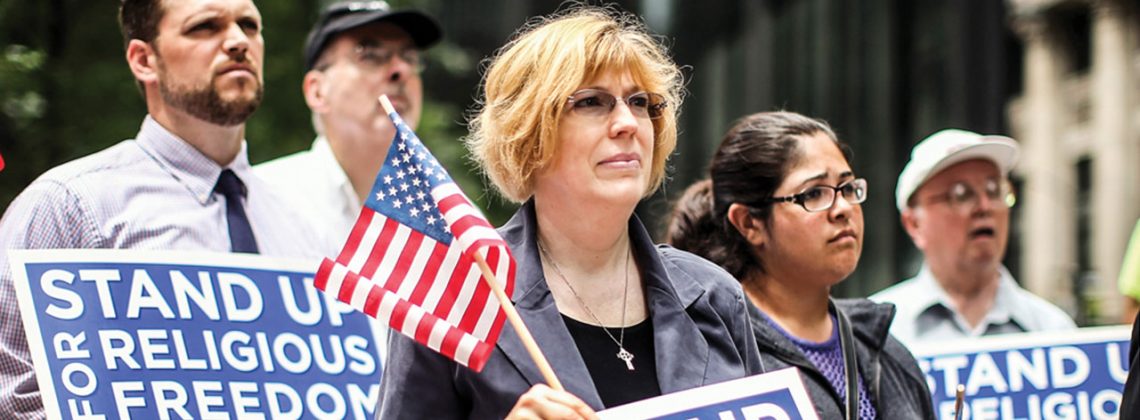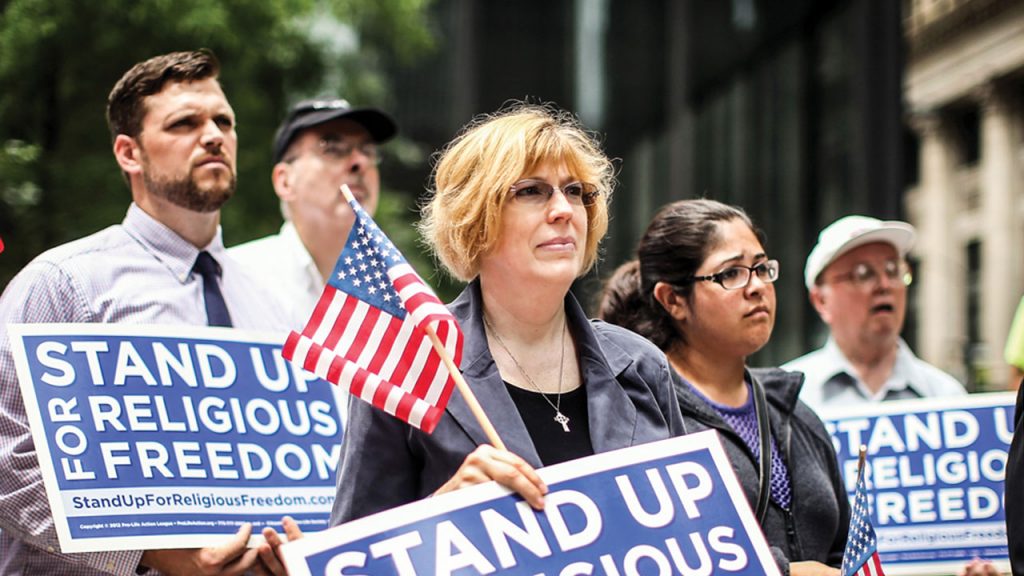

Here is Tish Harrison Warren at The New York Times:
This week, the Supreme Court will hear a case that will reignite a continuing conversation about what to do when long-established religious convictions clash with gay people’s civil rights. In 303 Creative LLC v. Elenis, a Colorado web designer, Lorie Smith, wants to create websites for clients’ weddings. She is a Christian, and because of her religious beliefs, she does not want to offer these services for same-sex weddings. However, she serves L.G.B.T.Q. customers for other design projects.
This week’s legal arguments will most likely focus primarily on questions around free speech: Can the government compel artists or designers to express messages that contradict their beliefs? In the public discourse more broadly though, this case, like the Masterpiece Cakeshop case in 2018, poses a question to us as a culture: How committed are we to true pluralism?
Pluralism is not the same as relativism — we don’t have to pretend that there is no right or wrong or that beliefs don’t matter. It is instead a commitment to form a society where individuals and groups who hold profoundly different and mutually opposed beliefs are welcome at the table of public life. It is rooted in love of neighbor and asks us to extend the same freedoms to others that we ourselves want to enjoy. Without a commitment to pluralism, we are left with a society that either forces conformity or splinters and falls apart.
Millions of Americans have irreconcilable views of sex and marriage, and this is unlikely to change any time soon. The historic teaching of the Christian faith is that holy matrimony is between a man and a woman. The Roman Catholic Church still holds to this definition, as does Eastern Orthodoxy, the majority of Anglican churches worldwide and most Protestant denominations in the United States and elsewhere. A majority of Muslim and Jewish denominations around the world hold a similar definition as well.
At the same time, since the Obergefell decision, the right to marry a person of either sex is the law of the land, which people have built their lives and families around. And there are millions of people in this country who identify as L.G.B.T.Q.: Just over 7 percent of American adults identify this way, with percentages substantially higher among younger adults. Many find Christianity’s historic stance painful, if not destructive.
L.G.B.T.Q. rights versus religious freedom threatens then to become a war of all against all. But it need not be. We must find ways to preserve and protect the civil rights of gay people while also allowing religious people who adhere to historic teachings on sex and marriage to freely practice their faith.
Sustaining pluralism becomes more difficult when we conflate disparate issues or societal clashes — if, say, we completely map the current conflict over gay rights and religious liberty onto civil rights decisions about racial discrimination and Jim Crow. This view assumes that opting out of designing a website for a same-sex wedding is legally and ethically identical to refusing to serve Black customers. We saw a comparison like this in the oral arguments for Obergefell, and I’ve heard it many times since. It equates individuals or organizations who hold longstanding religious beliefs on sex and marriage with white supremacists.
Claims of religious liberty were undeniably used as an excuse for racial discrimination. If the analogy holds between racial discrimination and declining to provide services for a gay wedding, then there is no debate to be had. We cannot “both sides” opposition to Jim Crow.
However, the right analogy is crucial here, and correct distinctions are critical. In order to justify racial violence and oppression, white people in America and Europe essentially invented a novel theology, baptizing white supremacy. It was racism in search of an ethic. Sexual ethics, by contrast, are named and addressed in religious scriptures in specific terms. Unlike white supremacy, religious teaching regarding sex, including prohibitions on extramarital and premarital sex, pornography, lust and same-sex sexual activity have been part of the Christian faith from its earliest days. This is not an aberrant view rooted in bigotry but a sincere belief that flows from ancient texts and teaching shared by believers all over the world.
Read the entire piece here.
The Rev Harrison Warren, in her typically gentle manner, attempts to discourage readers from inaccurate historical analogies, in this case those who turn to American racism for perspective on LGBTQ liberties and rights. I would say that engaging such historical analogies in public policy debates is a mugg’s game, a version of whack a mole, a fool’s errand—pick your own analogy. My particular concern is her argument about the misguided comparison of contemporary Christian criticism of LGBTQ tolerance to racism. If we go back less than two centuries, she tells us, we’ll see evidence for the heinous, weaponized use of Scripture and theology to defend the enslavement of African-Americans, a bigotry unlike the principled criticism of same-sex marriage.
I would respond that Christians don’t get off the hook so easily. Scripture offers no outright condemnation of slavery, at best encouraging slaves to obey masters and enjoining masters to gentleness. The Apostle Paul famously claimed that in Christ there was neither “slave or free, male or female”, but all made one body in the Savior (Gal. 3:28). Yet this passage gives us no clue if the Apostle rejected the philosophical tradition, stemming with Aristotle, that some humans were “natural” slaves. Paul did use terms like “natural” and “unnatural” about sexual relations, but also about “wild” Gentiles “grafted” onto the “cultivated” or “natural” branch of Israel (Rom. 1:26-27; 11:24). Did Paul have a “ontology” of slavery? That seems difficult to know. He and the early church seemed far more preoccupied with preaching the Good News, than social liberation. Only in the last couple of centuries can we find the historical Christian church engaged in robust social or political liberation directed, for example, on behalf of common laborers. The Church’s historical relationships to indigenous peoples, those they called “savages” in the early age of colonialism, isn’t any more encouraging.
Therefore, adopting historical analogies from the history of the Church to the present, from whatever side, is another version of cherry picking. It seems appropriate to recall that even two centuries ago, the Rev Harrison Warren would have found among her fellow Anglicans little encouragement for her own ordination. Those by-gone colleagues would have turned to the language of “natural” and “unnatural” to refuse her a place in the pulpit, as well as receiving the sacraments from her. Her presence among us as an ordained minister is of course our gain. Still, turning to historical analogies of the “historical Christian church” is a much more fraught task than her column suggests.